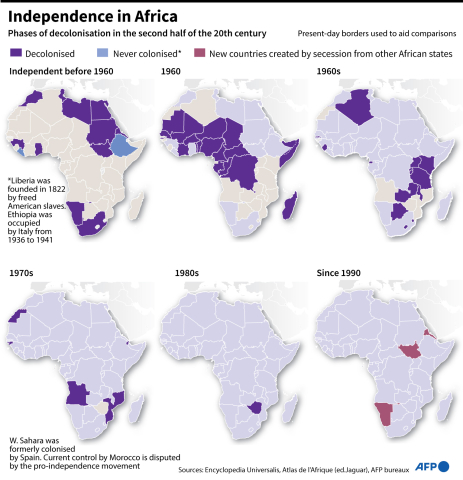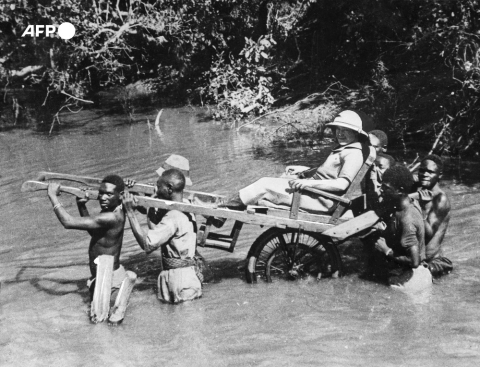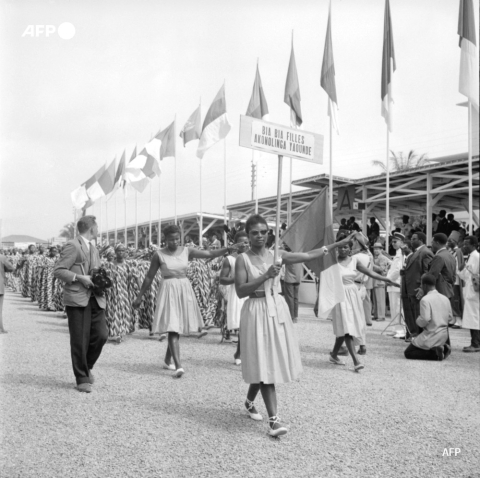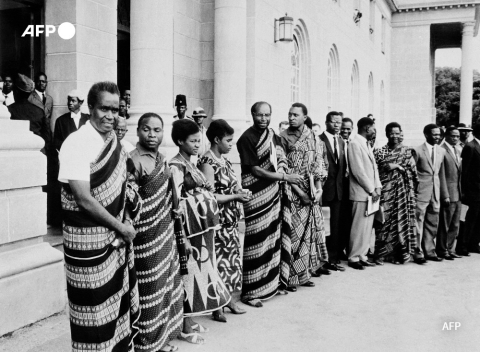Decolonisation in dates

A timeline of the colonisation and decolonisation of the African continent by European powers.
- Scramble for Africa -
- November 15, 1884 : With European nations already making inroads into Africa, 14 countries meet in Berlin to coordinate the colonisation of the continent.
- February 26, 1885 : The Berlin Conference winds up with the General Act of regulations for colonisation. Within 15 years all of Africa -- with the exception of Ethiopia, Liberia and Morocco -- will have been shared out between the main European powers.
- 1910 : First a Dutch and then a British colony, South Africa unites and becomes independent under a white-minority government.
- 1914-1918 : World War I fuels resentment in the colonies which lose tens of thousands of men enlisted to fight for their colonial masters.
- 1922 : Egypt gains independence from Britain.
- 1935-1941 : Italy occupies Ethiopia but its troops are forced out.

- Push for independence -
- 1939-1945 : World War II leaves the colonial powers weakened. The themes of freedom and democracy advanced by victors Britain and France stoke demands for independence in their colonies.
- 1941 : US President Franklin D. Roosevelt and British Prime Minister Winston Churchill agree on the Atlantic Charter which calls for the independence of all colonies.
- 1945 : French forces fire on pro-independence demonstrations in Algeria's Setif region, sparking days of unrest in which thousands are killed.
- 1947 : The start of the French army's repression of nationalist uprisings in Madagascar that leaves between 10,000 and 100,000 dead, according to different sources.
- 1951 : Independence of Libya, a former Italian colony shared between France and Britain after World War II.
- 1955 : Twenty-nine African and Asian -- mostly newly independent -- meet Bandung, Indonesia and criticise colonisation, asserting the right to political independence and territorial integrity for all nations.
- 1956 : The French colonies of Morocco and Tunisia become independent, as does Sudan from joint British and Egyptian rule.
- 1956 : Egypt nationalises the Suez Canal, which had been controlled by Britain and France.
- 1957 : The Gold Coast becomes the first sub-Saharan country to achieve independence, renamed Ghana.

- 1958 : General Charles de Gaulle tells French colonies to choose between being part of a Franco-African community or immediate and outright independence. Only Guinea opts for the latter, becoming independent in October.
- 1959 : An uprising at Leopoldville, capital of the Belgian Congo, is harshly repressed.
- 'Wind of Change' -
- January 1960 : Cameroon is the first of 14 French colonies to gain independence the same year, as do the Belgian Congo, Nigeria (formerly British) and Somalia (Britain/Italy).
- February 1960 : British Prime Minister Harold MacMillan delivers his "Wind of Change" speech to the South African parliament, indicating his government would not prevent independence in its African colonies.
- September 1960 : At the UN General Assembly, Ghana President Kwame Nkrumah calls for independence for all remaining colonies in Africa.
- 1961 : Sierra Leone, Cameroon and Tanzania (Tanganyika) become independent from Britain.
- 1962 : Former Belgian colonies become independent under the names of Rwanda and Burundi. Algeria is made independent from France and Uganda from Britain.
- 1963 : Kenya is independent after a brutal crackdown on Mau Mau fighters who battled British colonial rule for years.
- May 1963: Thirty-two African nations form the Organisation of African Unity (OAU) which vows to eradicate colonisation and also agrees that borders traced in Berlin cannot be redrawn.

- 1964 : Malawi (Nyasaland) and Zambia (Northern Rhodesia) become independent from Britain.
- 1965 : Britain grants The Gambia full independence.
- 1966 : Britain also gives up the small southern African kingdoms of Swaziland and Lesotho.
- 1975 : After the fall of Portugal's dictatorship in 1974, all its remaining African colonies become independent: Angola, Mozambique, Cape Verde, and Sao Tome and Principe.
- 1977 : Djibouti, in the Horn of Africa, votes for independence from France.
- 1980 : Rhodesia becomes independent under the name Zimbabwe, after being ruled by a white-minority government that had unilaterally declared independence from Britain in 1965.
